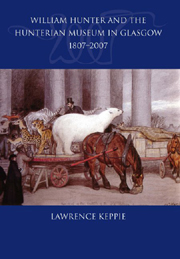Book contents
- Frontmatter
- Contents
- Foreword by Sir Kenneth Calman
- Introduction
- List of Illustrations
- Acknowledgements
- Abbreviations used in the Notes
- Dedication
- 1 William Hunter's Life and Career
- 2 Growth of the Hunterian Collection
- 3 ‘The Noblest Legacy upon Record’
- 4 A Temple of the Muses: the First Hunterian Museum in Glasgow
- 5 ‘This Place of Fascination’: the Impact of the Museum, 1807–70
- 6 A New Museum for a New University, 1870–1900
- 7 The Twentieth Century: War, Peace and Renewal, 1900–75
- 8 The Hunterian Art Gallery
- 9 Modern Times, 1975–2007
- 10 Overview: Meeting William Hunter's Intentions
- Postscript: Looking to the Future
- Notes
- Appendix: Catalogues of the Hunterian Collections
- Bibliography
- Index
- Plate section
1 - William Hunter's Life and Career
Published online by Cambridge University Press: 12 September 2012
- Frontmatter
- Contents
- Foreword by Sir Kenneth Calman
- Introduction
- List of Illustrations
- Acknowledgements
- Abbreviations used in the Notes
- Dedication
- 1 William Hunter's Life and Career
- 2 Growth of the Hunterian Collection
- 3 ‘The Noblest Legacy upon Record’
- 4 A Temple of the Muses: the First Hunterian Museum in Glasgow
- 5 ‘This Place of Fascination’: the Impact of the Museum, 1807–70
- 6 A New Museum for a New University, 1870–1900
- 7 The Twentieth Century: War, Peace and Renewal, 1900–75
- 8 The Hunterian Art Gallery
- 9 Modern Times, 1975–2007
- 10 Overview: Meeting William Hunter's Intentions
- Postscript: Looking to the Future
- Notes
- Appendix: Catalogues of the Hunterian Collections
- Bibliography
- Index
- Plate section
Summary
Birth and ducation
On 23 May 1718 William Hunter was born to parents John Hunter and Agnes Paul, at or near the family farmhouse at Long Calderwood, a few miles east of the then village of East Kilbride, South Lanarkshire. William was the seventh of the couple's ten children, of whom six survived into adulthood. His father, earlier a grain merchant in Glasgow, moved to East Kilbride on marriage in 1707, and purchased the estate and farmhouse at Long Calderwood in 1717.
The house still stands today (Figure 1.1), a solid two-storey stone building now engulfed in the much expanded ‘new town’ of East Kilbride. In 1956 a trust was formed to preserve and manage it, comprising the East Kilbride Development Corporation, the University of Glasgow and the Royal College of Physicians and Surgeons of Glasgow; the trust was wound up in 1985. More recently the house has been refurbished by South Lanarkshire Council and is now presented as the Hunter Birthplace Museum, a tribute to the brothers William and John.
William attended school from the age of eight in nearby East Kilbride. Reminiscences of him as a schoolboy by his sister Dorothea are preserved in the Hunter-Baillie papers. William was the only one of John Hunter's sons we can be sure attended the local seat of higher learning, Glasgow University (then generally known as Glasgow College). In 1731, at the age of thirteen, which was normal for the times, William matriculated there to study for the degree of Master of Arts, and was awarded an annual bursary of £10 per annum.
- Type
- Chapter
- Information
- Publisher: Edinburgh University PressPrint publication year: 2007



